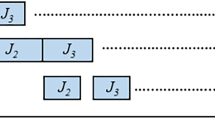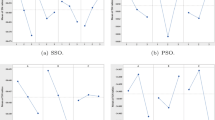Abstract
A job processed later may consume more time in many realistic machine scheduling situations than the same job when processed earlier. This phenomenon is known as the deterioration of jobs. In this paper, two-machine flowshop scheduling problem under piecewise linear deteriorating jobs is investigated where the objective is to minimize the makespan. Deteriorating jobs may increase the makespan and it is important to obtain the optimal or near-optimal solution. Tab;At first, a Mixed Integer Non-Linear Programming (MINLP) model is presented for the problem and linearization of it is performed. After that, a branch and bound algorithm with dominance rules and lower bounds is established to solve the problem optimally. Several simple heuristics are also proposed to derive near-optimal solutions. The computational experiments are conducted through randomly generated examples to evaluate the performance of the proposed algorithms. The results demonstrate that the branch and bound algorithm can solve most medium-sized problems within a reasonable time. The heuristic algorithm is relatively accurate, with an average error percentage of less than 1.6%.



Similar content being viewed by others
Data Availability
Data will be made available on reasonable request.
References
Liao B, Wang H, Zhu X, Yang S, Pardalos PM (2020) Improved DE search for competing groups scheduling with deterioration effects. Optim Lett. https://doi.org/10.1007/s11590-020-01581-4
Lee WC, Lu ZS (2012) Group scheduling with deteriorating jobs to minimize the total weighted number of late jobs. Appl Math Comput 218:8750–8757
Mor B, Mosheiov G (2020) Minimizing total load on parallel machines with linear deterioration. Optim Lett 14:771–779
Jafari A, Moslehi G (2012) Scheduling linear deteriorating jobs to minimize the number of tardy jobs. J Glo Optim 54:389–404
Lu S, Liu X, Pei J, Pardalos PM (2021) Permutation flowshop manufacturing cell scheduling problems with deteriorating jobs and sequence dependent setup times under dominant machines. Optim Lett 15:537–551
Moslehi G, Jafari A (2010) Minimizing the number of tardy jobs under piecewise-linear deterioration. Comput Ind Eng 59:573–584
Lee WC, Wu CC, Chung YH (2008) Scheduling deteriorating jobs on a single machine with release times. Comput Ind Eng 54:441–452
Wu CC, Lee WC (2006) Two-machine flowshop scheduling to minimize mean flow time under linear deterioration. Int J Prod Econ 103:572–584
Wang JB, Wang MZ (2013) Minimizing makespan in three-machine flow shops with deteriorating jobs. Comput Oper Res 40:547–557
Ng CT, Wang JB, Cheng TCE, Liu LL (2010) A branch-and-bound algorithm for solving a two-machine flow shop problem with deteriorating jobs. Comput Oper Res 37:83–90
Li K, Chen J, Fu H, Jia Z, Wu J (2020) Parallel machine scheduling with position-based deterioration and learning effects in an uncertain manufacturing system 149 106858
Lee WC, Wu CC, Wen CC, Chung YH (2008) A two-machine flowshop makespan scheduling problem with deteriorating jobs. Comput Ind Eng 54:737–749
Yang SH, Wang JB (2011) Minimizing total weighted completion time in a two-machine flow shop scheduling under simple linear deterioration. Appl Math Comput 217:4819–4826
Wang L, Sun LY, Sun LH, Wang JB (2010) On three-machine flow shop scheduling with deteriorating jobs. Int J Prod Econ 125:185–189
Wang JB, Ng CTD, Chen TCE, Liu LL (2006) Minimizing total completion time in a two-machine flow shop with deteriorating jobs. Appl Math Comput 180:185–193
Liu S, Pei J, Cheng H, Liu X, Pardalos PM (2019) Two-stage hybrid flow shop scheduling on parallel batching machines considering a job-dependent deteriorating effect and non-identical job sizes. App Soft Comput J 84, 105701
Sanchez-Herrera S, Montoya-Torres JR, Solano-Charris EL (2019) Flow shop scheduling problem with position-dependent processing times. Comput Oper Res 111:325–345
Kubiak W, Velde S (1998) Scheduling Deteriorating Jobs to Minimize Makespan. Nav Res Logist 45:511–523
Cheng TCE, Ding Q, Lin BMT (2004) A concise survey of scheduling with time-dependent processing times. Eur J Oper Res 152:1–13
Pinedo M (2002) Scheduling: Theory, algorithms and systems. Prentice Hall, Upper Saddle River
Woo YB, Kim BS, Moon I (2019) Column Generation Algorithms for a Single Machine Problem with Deteriorating Jobs and Deterioration Maintenance Activities. Procedia Manufactur 39:1119–1128
Mosheiov G (1994) Scheduling jobs under simple linear deterioration. Comput Oper Res 21:653–659
Pei J, Cheng B, Liu X, Pardalos PM, Kong M (2019) Single-machine and parallel-machine serial- batching scheduling problems with position-based learning effect and linear setup time. Ann Oper Res 272:217–241
Lee WC, Lin JB, Shiau YR (2011) Deteriorating job scheduling to minimize the number of late jobs with setup times. Comput Ind Eng 61:782–787
Kong M, Liu X, Pei J, Zhou Z, Pardalos PM (2019) Parallel-batching scheduling of deteriorating jobs with non-identical sizes and rejection on a single machine. Optim Lett 14:857–871
Cheng TCE, Hsu CJ, Huang YC, Lee WC (2011) Single-machine scheduling with deteriorating jobs and setup times to minimize the maximum tardiness. Comput Oper Res 38:1760–1765
Chung BD, Kim BS (2016) A hybrid genetic algorithm with two-stage dispatching heuristic for a machine scheduling problem with step-deteriorating jobs and rate-modifying activities. Comput Ind Eng 98:113–124
Layegh J, Jolai F, Amalnik MS (2009) A memetic algorithm for minimizing the total weighted completion time on a single machine under step-deterioration. Advances Eng Softw 40:1074–1077
Cheng TCE, Kravchenko SA, Lin BMT (2020) Scheduling Step-deteriorating Jobs to Minimize the Total Completion Time. Comput Ind Eng 144, 106329
Jafari A, Khademi-zare H, Lotfi MM, Tavakkoli-Moghaddam R (2016) Minimizing Makespan with Start Time-Dependent Jobs in a Two-Machine Flow Shop. Int J Eng IJE TRANSACTIONS B: Applications 29:778–787
Jafari A, Khademi-zare H, Lotfi MM, Tavakkoli-Moghaddam R (2016) A note on “minimizing makespan in three machine flowshop with deteriorating jobs.” Comput Oper Res 72:93–96
Jafari A, Khademi-zare H, Lotfi MM, Tavakkoli-Moghaddam R (2017) A note on “On three-machine flow shop scheduling with deteriorating jobs.” Int J Prod Econ 191:250–252
Mosheiov G, Sarig A, Sidney J (2010) The Browne-Yechiali single-machine sequence is optimal for flow-shops. Comput Oper Res 37:1965–1967
Lee WC, Yeh WC, Chung YH (2014) Total tardiness minimization in permutation flowshop with deterioration consideration. Appl Math Model 38:3081–3092
Ouazene Y, Yalaoui F (2018) Identical parallel machine scheduling with time-dependent processing times. Theoretical Comput Sci 721:70–77
Cheng M, Wang G, He L (2009) Parallel machine scheduling problems with proportionally deteriorating jobs. Int J Syst Sci 40:53–57
Woo YB, Kim BS (2018) Matheuristic approaches for parallel machine scheduling problem with time-dependent deterioration and multiple rate-modifying activities. Comput Oper Res 95:97–112
Woo YB, Jung S, Kim BS (2017) A rule-based genetic algorithm with an improvement heuristic for unrelated parallel machine scheduling problem with time-dependent deterioration and multiple rate-modifying activities. Comput Ind Eng 109:179–190
Brucker P (2006) Scheduling algorithms. Berlin, Heidelberg (2006)
Browne S, Yechiali U (1990) Scheduling deteriorating jobs on a single processor. Comput Oper Res 38:495–498
Author information
Authors and Affiliations
Corresponding author
Ethics declarations
Conflict of Interest
The authors notify that they have no conflict of interest.
Additional information
Publisher's Note
Springer Nature remains neutral with regard to jurisdictional claims in published maps and institutional affiliations.
Rights and permissions
About this article
Cite this article
Jafari-Nodoushan, A., Zare, H.K., Lotfi, M. et al. Scheduling Piecewise Linear Deteriorating Jobs to Minimize Makespan in a Two-Machine Flowshop. Oper. Res. Forum 2, 49 (2021). https://doi.org/10.1007/s43069-021-00096-7
Received:
Accepted:
Published:
DOI: https://doi.org/10.1007/s43069-021-00096-7




